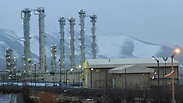
World powers must reject Iranian offer
Analysis: Headlines about compromises and concessions offered by Tehran are simply part of its negotiation strategy.
One headline announced that "Iran has neutralized half of its stockpile of higher-enriched uranium." Another headline reported that the head of the Atomic Energy Organization of Iran, Ali Salehi, declared that Iran and the world powers had reached an agreement on the technical changes which would reduce the production of the heavy water reactor in Arak – a reactor which would not be able to produce plutonium for a nuclear weapon after being completed.
Iran is allegedly showing willingness to compromise on the two routes leading to the development of a nuclear weapon: The uranium enrichment route and the plutonium production route. This is precisely the message Tehran is hoping to assimilate in the West.
But a look through the fine print in the published reports and a better understanding of the entire Iranian nuclear program lead to a completely different picture. Cutting the stockpile, for example, is not an Iranian concession but simply an implementation of the Iranian commitment as part of the interim agreement signed in November 2013. Tehran agreed to cut its stockpile of 20% enriched uranium, which is not even sufficient for one bomb, in order to preserve the low-level stockpile of the element (3.5%) which is sufficient for at least six bombs.
This is the Iranian strategy in the negotiations with the world powers: To preserve and maximize their achievements and to minimize the concessions. So instead of accepting the powers' demand to alter the Arak reactor so that it would not be able to produce fissile material for a bomb, Iran is offering technical changes which will reduce the production ability, but will not abolish it. Such technical changes are reversible in case of an Iranian decision to violate the agreement.
Iran is trying to portray itself as a country prepared to make fundamental concessions, but at the same time it is preserving the core abilities in both routes it is developing for a nuclear weapon.
The American suggestion is to focus on the demand for a tight and unprecedented system of inspection of the Iranian nuclear program as part of a final agreement. This demand is necessary in order to prevent Iran from developing a nuclear weapon in the future, but it is insufficient. The international inspection systems are not perfect and have always known to fail. They already failed in the past to discover on time the efforts made by Iraq, Libya, North Korea, Syria and Iran to secretly develop a military nuclear program. These systems can cease to exist in case of a unilateral Iranian decision – like what happened with North Korea.
Agreement on limited enrichment ability
There is a need, therefore, to agree on parameters which will keep Iran away from the bomb by extending the time required to develop a nuclear weapon if it decides to expel the inspectors or quits the Non-Proliferation Treaty.
As part of this demand, the powers must demand that Iran will dissolve most of the centrifuges and leave a symbolic number of non-advanced centrifuges. They must demand that the uranium enrichment stockpile in Iran will be limited to a low level and symbolic amount (less than the amount required for one bomb).
They must also demand the dismantlement of the enrichment site inside a mountain near Qom, which aims to guarantee a protected site immune to a quick breakthrough towards a bomb. They must demand that the Arak reactor will be altered so that it would not be used for military purposes and demand an answer to the open questions regarding the military dimensions of the Iranian nuclear program.
They must also determine that the agreement will be approved by the Security Council and will be valid for many years – a period which will guarantee a real change in the Iranian strategic conduct.
Ali Salehi, who "reported" the agreement on Arak, spoke about the need to agree to increase (!) the number of Iran's centrifuges to 20,000 in order to produce 30 tons (!) of fuel for the Bushehr reactor. This suggestion must be rejected because Iran had no need for fuel production – it receives a sufficient amount from Russia – and because increasing the stockpile of centrifuges and enriched material will bring Iran closer to a bomb, rather than keeping it away.
The official Israeli stance still calls for a complete dismantlement of the Iranian nuclear program, but it seems that even Israel's close ally, the United States, has made up its mind to allow the Iranians to have a nuclear program under certain restrictions.
Therefore, even if the public Israeli statements play a role in preventing a further drift in the American stance in the negotiations with Iran, in closed rooms the Israelis and Americans must the outline of a final agreement Israel will be able to live with, even if it includes a limited Iranian ability to enrich uranium – providing that the time it takes Iran to develop a nuclear weapon, if it decides to do so, will be measured in years rather than in months and will enable the international community to detect a "breakthrough" towards a weapon, decide on a course of action and implement it before the Iranians reach a nuclear weapon.
Sticking to the official Israeli stance even in the discussion rooms could neuter the Israeli ability to influence the negotiations with Iran in which it is not present.
Major-General (res.) Amos Yadlin, a former head of the IDF Military Intelligence Directorate, serves as director of Tel Aviv University’s Institute for National Security Studies (INSS).










